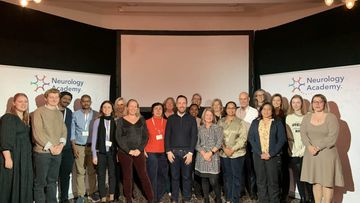Leading for change – equipping you to raise the bar for MS services
‘Leadership is, simply put, influencing someone for the common good’.
Professor Gabriele De Luca and Barbara Hoese, President of Pentecore Coaching LLC, a leadership development and coaching firm, led an interactive presentation, exploring what leadership is, the skills needed to effect change, and how best to equip our clinicians to do it.
Beginning with a number of breakout discussions, the 120 plus group of healthcare professionals identified what the difference between a manager and a leader is (concisely summarised into ‘management is the detail, leadership is the big picture’), and what makes a good leader – namely ‘integrity’.


Barbara talked about a leader’s ‘essence’ and their ‘form’. A leader's form (what they do) attracts and their essence (who they are) engages. The two combine to create integrity.
Integrity was pulled out as a key leadership skill by the room long before Barbara mentioned form and essence, with delegates talking about ‘talk and action aligning’, ‘leading by example’ and ‘being willing to do the little jobs’.
A leader’s essence includes their own personal purpose, and Barbara was clear to highlight that whilst an individual’s purpose need not be the same as their organisations’ or projects’, it must align, or that sense of integrity is lost.
So is leading for change a different breed of leading? How do you mobilise form and essence to effect change? Gabriele highlighted three ‘rules’ to leading for change...
Change is inevitable and ever continuing

In this rule, the key practice is to keep stepping back, looking at the big picture, understanding if the right people are in the right places, and using a collective vision to steer the change.
- Formative: the goal is to identify a successful pattern that will move us through the change.
- Normative: often starts with enthusiasm and structure but growth can begin to slow later in this phase
- Integrative: sustaining what is going on whilst creating the new and shifting as you change again
Being familiar with who shares your vision or not, and what their attitude and energy levels are in relation to the change being implemented was highlighted as key, with most attitudes requiring active engagement. Whether a colleague has a great attitude about the change but no energy to act, or a poor attitude and far too much energy, actively opposing the change, it is essential to form and develop relationships with everyone involved.
Leading change takes energy


Leading change requires energy, but it is fair to say that going through change requires energy too.
Gabriele shared that
‘altering 5-8% of a person’s job can make them feel like their whole role has changed.’
As a leader, assessing the impact of the change and peoples’ attitudes towards it, and helping a team cope with the change by ‘stewarding the constants’ is key.
Change needs coalitions

The final rule highlights the essential nature of relationships, but also the important role that everyone has in leading, to an extent.
Whether the ‘leader’ of the project or not, those who are positive about the change can be proactive and lead by example in turn, changing the working environment and encouraging those who are less engaged to become engaged.
Leadership programme to launch
When the national programme to tackle MS service variance began with ‘the Way Forward’ event last November, it was recognised that, to see real, lasting change in services, we needed to invest in leadership.
Gabriele and Barb announced that they have created a bespoke leadership development programme for healthcare professionals involved in this work. The programme, led by the two of them, will be facilitated by the MS Academy and begins in February 2020. Involving a combination of residential courses, online teaching and personal projects, the selective programme will focus on the practical and will encourage a new generation of leaders to effect change in their localities.
Leadership is, simply put, influencing someone for the common good. What skills do you have? How can you influence change? Our vision is to improve MS services for all people with MS and their families, and to make delivering these services for all involved a rich and rewarding experience. Can you help lead your Centre towards this goal?

More information
- Find out more about the leadership programme.
- To find out more about the three-year plan for the national programme to tackle MS service variance, to read about the background, or to learn about the 5 workstreams, visit our website at www.multiplesclerosisacademy.org/news
Related articles
Encouraging excellence, developing leaders, inspiring change
MS Academy was established five years ago and in that time has accomplished a huge amount. The six different levels of specialist MS training are dedicated to case-based learning and practical application of cutting edge research. Home to national programme Raising the Bar and the fantastic workstream content it is producing, this is an exciting Academy to belong to.


